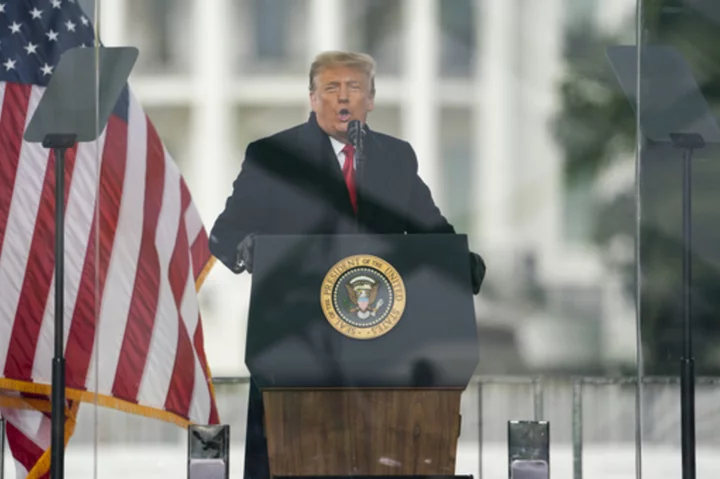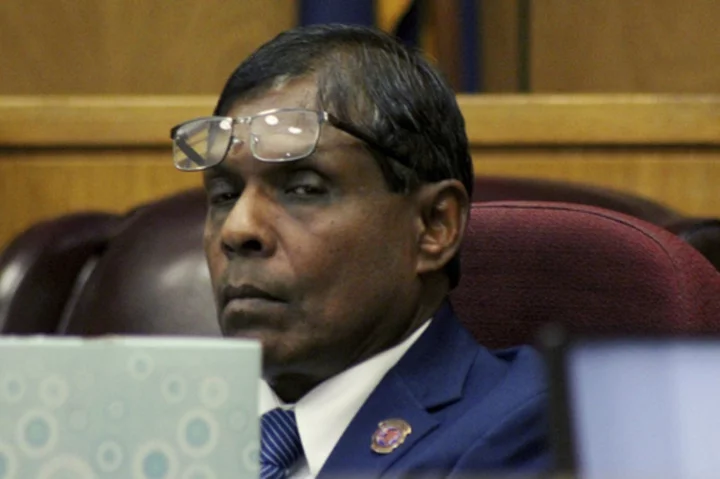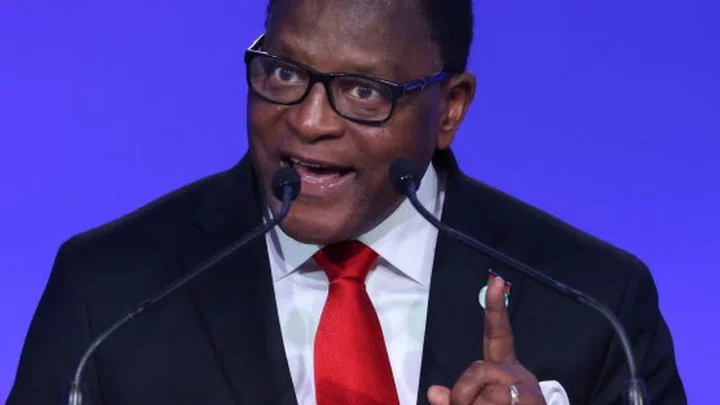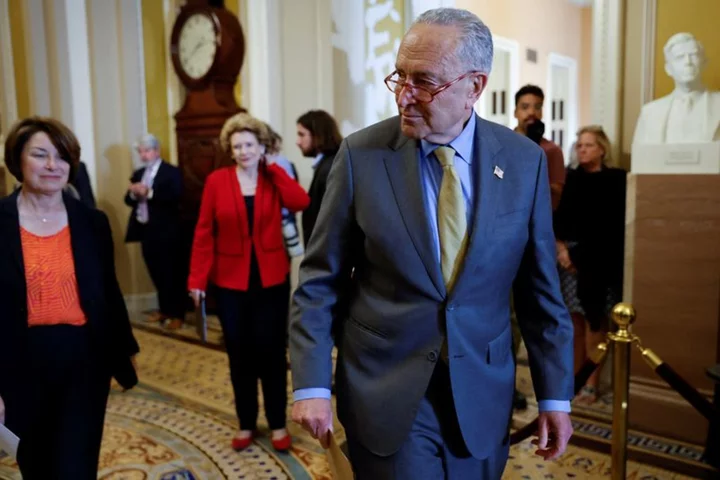As former President Donald Trump continues to dominate the Republican presidential primary, some liberal groups and a growing number of legal experts contend that a rarely used clause of the Constitution prevents him from being president after the Jan. 6, 2021, attack on the U.S. Capitol.
The 14th Amendment bars anyone from holding office who once took an oath to uphold the Constitution but then “engaged” in “insurrection or rebellion” against it. A growing number of legal scholars say the post-Civil War clause applies to Trump after his role in trying to overturn the 2020 presidential election and encouraging his backers to storm the U.S. Capitol.
Two liberal nonprofits pledge court challenges should states' election officers place Trump on the ballot despite those objections.
The effort is likely to trigger a chain of lawsuits and appeals across several states that ultimately would lead to the U.S. Supreme Court, possibly in the midst of the 2024 primary season. The matter adds even more potential legal chaos to a nomination process already roiled by the frontrunner facing four separate criminal trials.
Now Trump's very ability to run could be litigated as Republicans are scheduled to start choosing their nominee, starting with the Iowa caucuses on Jan. 15.
“There's a very real prospect these cases will be active during the primaries,” said Gerard Magliocca, a law professor at Indiana University, warning that there could be different outcomes in different states before the Supreme Court makes a final decision. “Imagine you have an opinion that says he's not eligible and then there's another primary where he's on the ballot.”
Though most litigation is unlikely to begin until October, when states begin to set their ballots for the upcoming primary, the issue has gotten a boost from a recently released law review article written by two prominent conservative law professors, William Baude and Michael Paulsen. They concluded that Trump must be barred from the ballot due to the clause in the third section of the 14th Amendment.
That section bars anyone from Congress, the military, and federal and state offices if they previously took an oath to support the Constitution and “have engaged in insurrection or rebellion against the same, or given aid or comfort to the enemies thereof.”
In their article, scheduled to be published in the University of Pennsylvania Law Review, Baude and Paulsen said they believe the meaning is clear.
“Taking Section Three seriously means excluding from present or future office those who sought to subvert lawful government authority under the Constitution in the aftermath of the 2020 election," they write.
The issue came up during last week's Republican presidential debate in Milwaukee, when former Arkansas Gov. Asa Hutchinson warned that “this is something that could disqualify him under our rules and under the Constitution.”
In 2021, the nonprofit Free Speech For People sent letters to the top election official in all 50 states requesting Trump's removal if he were to run again for the presidency. The group's legal director, Ron Fein, noted that after years of silence, officials are beginning to discuss the matter.
“The framers of the 14th Amendment learned the bloody lesson that, once an oath-breaking insurrectionist engages in insurrection, they can't be trusted to return to power,” Fein said.
Ahead of the 2022 midterms, the group sued to remove U.S. Rep. Marjorie Taylor-Greene and former Rep. Madison Cawthorn, both Republicans, from the ballot over their support for the Jan. 6 protest. The judge overseeing Greene's case ruled in her favor, while Cawthorn's case became moot after he was defeated in his primary.
The complex legal issues were highlighted on Wednesday when the Arizona Republic reported that Secretary of State Adrian Fontes said his hands are tied because of a ruling by that state's high court that only Congress can disqualify someone on Arizona's presidential ballot. Fontes, a Democrat, called the ruling “dead, flat wrong” in an interview with the Republic but said he would abide by it.
If Trump appears on the Arizona ballot, those who believe he's not qualified can still sue in federal court to remove him.
Other secretaries of state are warily navigating the legal minefield.
In a radio interview earlier this week, Michigan Secretary of State Jocelyn Benson, a Democrat, said “there are valid legal arguments being made” for keeping Trump off the ballot and that it’s something she is discussing with other secretaries of state, including those in presidential battlegrounds.
Brad Raffensperger, the Republican secretary of state in Georgia who withstood pressure from Trump when he sought to overturn the 2020 results in the state, suggested the issue should be up to voters.
“As Georgia’s Secretary of State, I have been clear that voters are smart and deserve the right to decide elections.,” he said in an emailed statement.
Trump argues that any effort to prevent him from appearing on a state's ballot amounts to “election interference” — the same way he is characterizing the criminal charges filed against him in New York, Atlanta and by federal prosecutors in Washington, D.C., and Florida.
“And I think what’s happening is there’s really been a backlash against it," Trump told the conservative channel Newsmax.
Indeed, the New Hampshire Secretary of State's office was flooded with messages about the issue on Monday, said Anna Sventek, a spokeswoman. Earlier in the day, a conservative personality had falsely claimed the state was about to strike Trump from the ballot.
On Wednesday, a longshot Republican presidential candidate, John Anthony Castro of Texas, filed a complaint in a New Hampshire court contending the 14th Amendment barred Trump from that state's ballot.
The eventual, bigger court challenges are expected to draw greater legal fire power. But Michael McConnell, a conservative law professor at Stanford University who is not a Trump supporter, said the case is no slam dunk.
McConnell questions whether the provision even applies to the presidency because it is not one of the offices specifically listed in the 14th Amendment — which instead refers to “elector of president and vice president.” He also said it's unclear whether the Jan. 6 attack constitutes an “insurrection” under the law or simply a less legally fraught incident such as a riot.
But McConnell also worries about the political precedent if Trump is ultimately removed from any state ballot.
“It's not just about Trump. Every election where someone says something supportive of a riot that interferes with the enforcement of laws, their opponents are going to run in and try to get them disqualified,” he said.
Ratified in 1868, the 14th Amendment helped ensure civil rights for freed slaves — and eventually for all people in the U.S. — but also was used to prevent former Confederates officials from becoming members of Congress and taking over the government they had just rebelled against.
The clause allows Congress to lift the ban, which it did in 1872 as the political will to continue to bar former Confederates dwindled. The provision was almost never used after that. In 1919, Congress refused to seat a socialist in Congress, contending he gave aid and comfort to the country's enemies during World War I. Last year, in the provision's first use since then, a New Mexico judge barred a rural county commissioner who had entered the Capitol on Jan. 6 from office under the clause.
If any state bars Trump from running, his reelection campaign is expected to sue, possibly taking the case directly to the U.S. Supreme Court. If no state bans him, Free Speech For People and another nonprofit, Citizens for Responsibility and Ethics in Washington, would likely challenge his presence on the ballot.
It's critical that the high court settle the issue before the general election, said Edward Foley, a law professor at The Ohio State University. His fear is that if Trump's qualifications are not resolved and he wins, Democrats could try to block his ascension to the White House on Jan. 6, 2025, triggering another democratic crisis.
Those pushing to invoke the amendment agree and say they think the case is clear.
“This isn't a punishment. It's like saying a president needs to be 35 years old and a natural born citizen,” said Noah Bookbinder, president of Citizens for Responsibility and Ethics in Washington. “You also need not to have helped organize an uprising against the government.”









